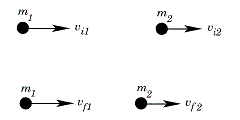Metric <-> Imperial <-> Metric
|
|
| Home | |
| Equivalents | |
| Internet Glossary |
This calculator (by Stephen R. Schmitt) computes the final velocities for an elastic collision of two masses in one dimension. The program is operated by entering the masses and initial velocities of two objects, selecting the rounding option desired, and then pressing the Calculate button. All entries are cleared by pressing the Clear button. It is assumed that m2 is to the right of m1 and that positive velocities are to the right. If the program returns the error message:
cannot solve
then the two masses would not collide -- check the initial velocities you specified
NotesThe total momentum of the system is a conserved quantity. Equating the total momentum before and after the collision: m1·vi1 + m2·vi2 = m1·vf1 + m2·vf2 This equation is valid for any 1-dimensional collision. Note that, assuming we know the masses of the colliding objects, the above equation only fully describes the collision given the initial velocities of both objects, and the final velocity of at least one of the objects. An elastic collision is one in which the total kinetic energy of the two colliding objects is the same before and after the collision. For an elastic collision, kinetic energy is conserved. That is: The collision is fully specied given the two initial velocities and masses of the colliding objects. Combining the above equations gives a solution to the final velocities for an elastic collision of two objects:0.5·m1·vi12 + 0.5·m2·vi22 = 0.5·m1·vf12 + 0.5·m2·vf22 Copyright © 2004, Stephen R. Schmittvf1 = [(m1 - m2)·vi1 + 2 m2·vi2]/(m1 + m2) vf2 = [2 m1·vi1 - (m1 - m2)·vi2]/(m1 + m2) |

